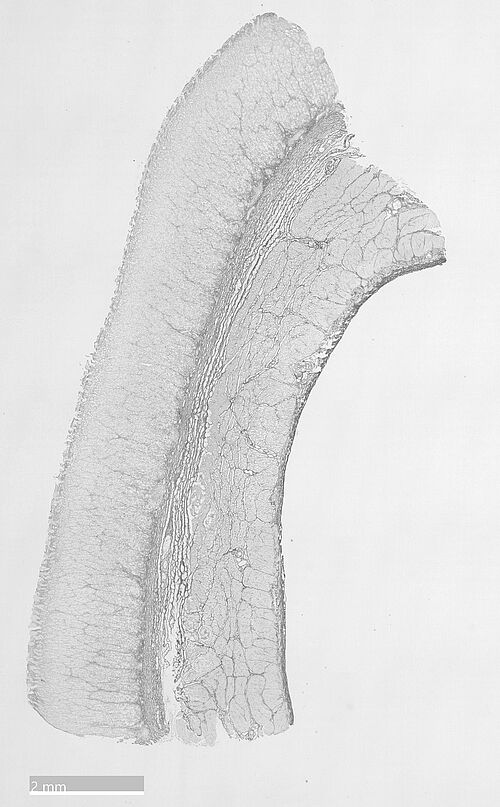

The stomach is a part of the digestive tract connecting the esophagus and the duodenum. It is a J-shaped hollow organ consisting of four parts: stomach dome, stomach entrance, stomach body and stomach outlet. In these parts the stomach wall varies in thickness, folds and behavior of the active contraction in order to satisfy different tasks of the stomach such as storing and breaking up the ingested aliment.
In the empty state, the stomach has many folds, whose quantity and magnitude depend on the region. These folds disappear in the filled state. Stomach muscles ensure the mixture and the reforwarding of the aliment as well they guarantee a basic tonus at a low filling level already. The stomach peristalsis and emptying is a rhythmic contraction of the muscles and dependent of different parameters like volume, osmotic pressure, acid concentration and chemical composition. The sphincter muscles are responsible for the segmentation of the aliment. Because of its complex microstructure and its macroscopic geometry, the stomach is mechanically flexible which keeps a low internal pressure at different volumes.
To characterise the non-linear, viscoelastic and strongly anisotropic stomach tissue, various tests are performed on stomach strips. Active experiments include tests of the elastic properties, the proliferation of the potential and the dependency of stress-length, stress-velocity and activation-length of the stomach. To measure the stress-length dependency, the stomach strips or single layers are tested in longitudinal and transversal orientation at the same time via a biaxial testing machine. To measure the dispersion of the potential and its velocity, tissue strips are used which are prepared with electrodes at the mucosal and serous side on the transversal and longitudinal muscles. The contraction is provoked via electrodes at one end of the strip or via stretch. Because of surface electrodes the proliferation velocity and the direction of the potential can be measured. In these tests the deformation is controlled by an optical measuring system.
On the whole stomach, contraction measurements are executed to describe the pressure progress and the three-dimensional deformation. Therefore, three kinds of tests are performed: First, isovolumetric measurements of the internal pressure in relation of the given liquid volumes, second, liquid volume release at isobaric contractions at different pressures and third, combined internal pressure, potential and deformation measurements. To determine the spatial distribution of the potential during the contraction, electromyography in form of surface electrodes is applied. To describe the complex architecture of the stomach wall, histological examinations are performed in a space-resolved way. Especially the orientation of collagen and muscles and their distribution in different layers in loaded and unloaded conditions are of interest for understanding the behavior of the stomach.
With these test results, a phenomenological electro-chemo-mechanical model can be developed which displays the whole contraction process beginning from the electric stimulus and ending at the mechanical contraction response. This model is validated continuously with the ongoing examination.
2020
M. Bauer, E. Morales-Orcajo, L. Klemm, R. Seydewitz, V. Fiebach, T. Siebert, M. Böl
Biomechanical and microstructural characterisation of the porcine stomach wall: Location- and layer-dependent investigations
Acta Biomaterialia, 102, 83-99, (2020) [Link]
L. Klemm, R. Seydewitz, M. Borsdorf, T. Siebert, M. Böl
On a coupled electro-chemomechanical model of gastric smooth muscle contraction
Acta Biomaterialia, 109, 163-181, (2020) [Link]
2019
A. E. Ehret, M. Böl
Recent topics in biomechanics and mechanobiology
GAMM Mitteilungen, 1, (2019) [Link]
2017
A. Tomalka, M. Borsdorf, M. Böl, T. Siebert
Porcine stomach smooth muscle force depends on history-effects
Frontiers in Physiology – Gastrointestinal Sciences, 8, 802, (2017) [Link]
2019
L. Klemm, M. Bauer, E. Morales-Orcajo, R. Seydewitz, M. Böl
On the electro-chemo-mechanical modelling of stomach smooth muscle contraction
Jahrestagung der Gesellschaft für Angewandte Mathematik und Mechanik (GAMM), Vienna (Austria), February 2019
2018
M. Böl
Biomechanics - Multi-scale/field experimental approaches
University of Kassel, Kassel (Germany), April 2018
2017
M. Böl
Advanced experiments on biological systems at different length scales
ETH Zurich, Zurich (Zwitzerland), December 2017